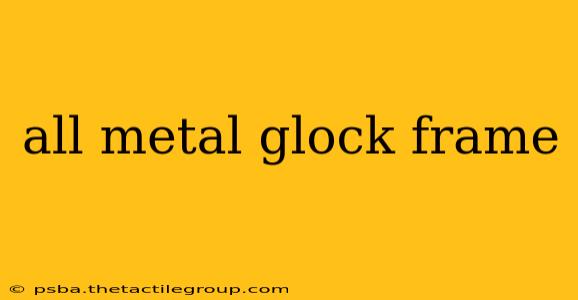The allure of a full-metal Glock frame is undeniable for many firearm enthusiasts. The perceived increase in durability, weight, and potentially even accuracy sparks considerable interest. But the reality of all-metal Glock frames is more nuanced than a simple upgrade. This comprehensive guide will explore the various aspects of metal Glock frames, examining the materials used, the modifications involved, and the critical considerations before making such a change.
Understanding the Appeal of Metal Glock Frames
Glock's polymer frames are renowned for their lightweight design, resistance to corrosion, and affordability. However, some shooters seek the characteristics often associated with metal frames:
- Increased Durability: The belief that a metal frame offers superior durability compared to polymer is a common driver. While metal can withstand significant impact, the longevity also depends on the specific metal alloy and the quality of the manufacturing process.
- Enhanced Weight and Recoil Management: The added weight of a metal frame can contribute to a perceived reduction in felt recoil, leading to improved control and potentially faster follow-up shots. This is particularly appealing to shooters with less experience or those firing higher-caliber rounds.
- Improved Accuracy (Debated): The claim of improved accuracy is often debated. While the increased weight can contribute to stability, the accuracy of a firearm is influenced by numerous factors, including the barrel, sights, and the shooter's skill. A metal frame alone doesn't guarantee significantly higher accuracy.
Types of Metal Glock Frame Modifications
The transformation of a Glock's polymer frame to metal isn't a simple swap. It requires significant modification and often involves aftermarket parts. Common approaches include:
- Complete Metal Frame Replacements: These are often custom-made or sourced from specialized manufacturers. These frames require professional fitting and may necessitate additional modifications to ensure proper functionality with existing Glock components.
- Metal Frame Kits: Some companies offer kits containing a metal frame receiver along with the necessary components for installation. However, careful research and consideration of compatibility are vital before purchasing.
Materials Used in Metal Glock Frames
Several metals are used in aftermarket Glock frames, each with its own set of properties:
- Steel: Steel offers high strength and durability. However, it can be heavier than other options and susceptible to rust if not properly protected.
- Aluminum: Aluminum offers a lighter-weight alternative to steel while retaining good strength. It's less susceptible to rust but can be more prone to damage under significant stress.
- Titanium: Titanium is exceptionally strong and lightweight, but it's significantly more expensive than steel or aluminum.
Considerations Before Switching to a Metal Glock Frame
Before investing in a metal Glock frame, carefully weigh the following:
- Legality: Check your local and state laws regarding firearm modifications. Some jurisdictions have restrictions on modifying firearms.
- Cost: Metal frames are considerably more expensive than standard polymer frames. Factor in the cost of installation and potential additional modifications.
- Compatibility: Ensure the metal frame is compatible with your existing Glock model and components. Incompatibility can lead to malfunction or damage.
- Weight: The increased weight of a metal frame might be a disadvantage for concealed carry or extended shooting sessions.
- Warranty: Installing a metal frame will likely void any existing manufacturer's warranty on your Glock.
Conclusion: Weighing the Pros and Cons
The decision to install an all-metal Glock frame is a personal one. While the perceived advantages of increased durability and potentially improved handling are appealing, the costs, potential compatibility issues, and legal considerations should be carefully evaluated. Thorough research, professional installation, and a clear understanding of the implications are crucial before undertaking such a modification. Remember, always prioritize safety and adhere to all applicable laws and regulations.

